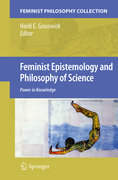
Feminist epistemology and philosophy of science: power in knowledge
Grasswick, Heidi E.
Having enjoyed more than twenty years of development, feminist epistemology and philosophy of science are now thriving fields of inquiry, offering current scholars a rich tradition from which to draw. In addition to a recognition of the power of knowledge itself and its effects on women’s lives, a central feature of feminist epistemology and philosophy of science has been the attention they draw to the role of power dynamics within knowledge-seeking practices andthe implications of these dynamics for our understandings of knowledge, science, and epistemology. Feminist Epistemology and Philosophy of Science: Power in Knowledge collects new works that address today’s key challenges for a power-sensitive feminist approach to questions of knowledge and scientific practice. The essays build upon established work in feminist epistemology and philosophy of science, offering new developments in the fields, and representing the broad array of the feminist work now being done and the many ways in which feminists incorporate power dynamics into their analyses. Third generation feminist work on today's key challenges for a power-sensitive feminist approach to questions of knowledge and scientific practice. Addressing the many ways in which feminists incorporate power dynamics into their analyses. Goes beyond the classic divisions of feminist empiricism, feminist standpoint theory, and feminist postmodernism, offering new interpretations andnew applications of these approaches. Includes a contribution from feminist epistemology pioneer Sandra Harding. INDICE: Introduction: Feminist Epistemology and Philosophy of Science in the Twenty-first Century; Heidi E. Grasswick. I Intersections: Feminism, Epistemology, and Science Studies. 1. The Marginalization of Feminist Epistemology and What That Reveals About Epistemology ‘Proper’; Phyllis Rooney. 2. Contextualism in Feminist Epistemology and Philosophy of Science; Kristina Rolin. 3. Altogether Now: A Virtue-theoretic Approach to Pluralism in Feminist Epistemology; Nancy Daukas. 4. The Implications of the New Materialisms for Feminist Epistemology; Samantha Frost. 5. Interrogating the Modernity vs. Tradition Contrast: Whose Science and Technology for Whose Social Progress?; Sandra Harding. IIDemocracy and Diversity in Knowledge Practices. 6. Is Millian Democratic Science the Right Model for Feminist Science?; Kristen Intemann. 7. What’s in it for me? The Benefits of Diversity in Scientific Communities; Carla Fehr. 8. What Knowers Know Well: Women, Work and the Academy; Alison Wylie. III Contexts of Oppression: Accountability in Knowing. 9. More than Skin Deep: Situated Communities and the Case of Agent Orange in the Aluoi Valley, Viet Nam; Nancy McHugh. 10. ‘They Treated Him Well’: Fact, Fiction, and the Politics of Knowledge;Lorraine Code. 11. Wrongful Requests and Strategic Refusals to Understand; Gaile Pohlhaus, Jr. 12. Liberatory Epistemology and Sharing Knowledge: Querying the Norms; Heidi E. Grasswick. Index.
- ISBN: 978-1-4020-6834-8
- Editorial: Springer Netherlands
- Encuadernacion: Cartoné
- Páginas: 222
- Fecha Publicación: 04/04/2011
- Nº Volúmenes: 1
- Idioma: Inglés
